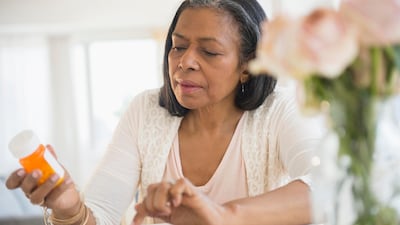About one in three people in the UAE bought from online pharmacies during the pandemic according to a new study, raising concerns over the dangers of self-diagnosis and fake medication.
The scientists behind the UAE-led research highlighted an “urgent need” for tougher controls on the sale of medications online.
Web-based pharmacies have become more common in recent years and the researchers suggested they had become even more popular because of the pandemic.
"In this time of crisis, it is crucial that OPs [online pharmacies] be more robustly controlled and that consumers be educated regarding the ways in which they purchase medication online," the study authors wrote in the Journal of Pharmaceutical and Policy Practice.
The researchers asked 420 UAE residents if they bought medication online since the pandemic emerged.
A total of 131 had done so at least once, including 118 who made multiple purchases.
Dietary supplements were purchased by 66 of those surveyed, pain relief medication by 26 , anti-histamines by 15, cough medicine by 14 and nasal sprays by 10.
Supplement sales surge in bid to bolster immune system
The pandemic may have led more people to take vitamin and herbal supplements in the hope doing this would strengthen their immune system, the researchers suggested.
“Any drug, even dietary supplements, may be harmful if administered without advice and/or supervision from a physician or pharmacist,” the researchers wrote.
The study found that older people were more likely to buy from online pharmacies, possibly because they had chronic conditions requiring regular medication.
Titled “Online medication purchasing during the Covid-19 pandemic: potential risks to patient safety and the urgent need to develop more rigorous controls for purchasing online medications, a pilot study from the UAE”, the study was written by researchers at Dubai Municipality, the Ministry of Health and Prevention, Al Ain University, Ajman University, Aden University in Yemen and the University of Huddersfield in the UK.
The UK’s National Health Service warns that unregistered online sellers may offer medicines that are new and unapproved, out of date, diluted or even fake.
Online sales are also said to increase the risk that people diagnose themselves – potentially wrongly – and may then be able to buy medicines supposed to be prescription-only.
Fears over 'sub-standard' medicines sold online
The researchers cited concerns about online pharmacies not taking a detailed history of the patient and his or her medication, of medicines clashing or reacting and of more than one therapy being taken at once.
“Clearly, illegitimate OPs [online pharmacies] are a significant patient threat when they sell sub-standard medication or poor quality products, but even legitimate pharmacies have the potential to cause serious adverse health outcomes for users,” they wrote.
To reduce risks, the researchers said online pharmacies should be required to register and to publish safety-related information about medication.
Tighter controls on industry required

“Stricter enforcement measures and tests need to be established to ensure that medications that are sold online are safe, of a sufficient quality and authentic,” they wrote.
One of the study’s authors, Dr Faris El Dahiyat, an associate professor in the College of Pharmacy at Al Ain University, said several safeguards should be in place.
"The purchase should be from UAE-based licensed pharmacies [and] the online pharmacy should have a pharmacist call the customer and verify the use of medication and provide patient counselling," he said.
"The prescription medication should be only sold after confirming the prescription is real and not fake."
He also said, however, that the study found that, rather than prescription-only medication, it was typically over-the-counter medicines and dietary supplements that were bought online and the UAE’s “excellent” authorities had “strict regulation” on the use of medication.
The number of people in the Gulf region buying medication online appears to have gone up significantly, with an earlier study in Saudi Arabia having found that only 2.7 per cent of people had made online purchases.




